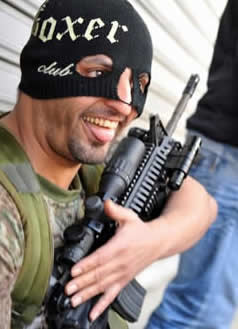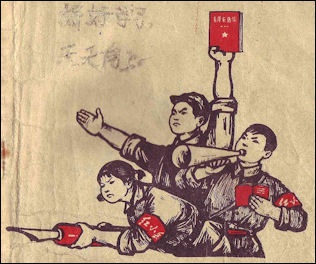 [DAWN] What percentage of the total population is Moslem? This was a question in a recent UK poll. The average number calculated from the replies given by respondents was 21 per cent. The actual figure is 5pc. This ignorance was even worse in the United States where people think Moslems make up 15pc of its total population when it's only one per cent. [DAWN] What percentage of the total population is Moslem? This was a question in a recent UK poll. The average number calculated from the replies given by respondents was 21 per cent. The actual figure is 5pc. This ignorance was even worse in the United States where people think Moslems make up 15pc of its total population when it's only one per cent.
The situation in La Belle France is even worse: people think 31pc of its population are Moslems when the figure is actually 8pc.
So what makes people overestimate the number of Moslems in their midst so wildly? While respondents in the opinion poll were also off the mark when it came to guessing the total number of immigrants as a percentage of the population, the difference between reality and their estimates was not as wide.
It would appear that the bigger the figure for Moslems in a person's mind, the greater his discomfort at their presence. Over the years, a number of factors have fed into an anti-Moslem prejudice and perceptions.
Firstly, Moslems in the West form a very visible community as a majority of the women wear traditional clothing, with many opting for either the full niqab or a headscarf; young men often grow beards. They thus stand out in a way other communities don't.
| True in Britain, not nearly so common in America. |
The community also preserves its cultural and religious practices by not going to pubs with colleagues and neighbours, and insisting on halal meat.
| Again, much more of an issue in Britain than America. |
Then there are many horror stories in the media about forced marriages and honour killings that take place in Moslem communities.
Ummm... True horror stories...
After the famous fatwa against Salman Rushdie and the worldwide riots over the Danish newspaper cartoons, Moslems are also seen as violent and humourless people who cannot abide criticism of their faith, even in fiction. Reports about non-Moslems persecuted and even killed under the blasphemy laws reinforce this perception of an intolerant community.
Nobody's done anything to alleviate this impression, either. Instead, Moslem governments have gone to the UN to try and have making fun of them outlawed worldwide.
People in the UK were appalled when Mohammed Asghar, a 70-year-old British citizen with a known history of mental illness, was condemned to death for alleged blasphemy. In a newspaper interview, his daughter expressed her rage over the fact that he had been shot while in jail.
He actually wouldn't have been in jug in Soddy Arabia.
Even more damaging to the image of Moslems in Britannia have been the widely covered reports about gangs of mostly Paks who have been preying on vulnerable maidens of tender years for years. While the dictates of political correctness have prevented many here from openly viewing this in purely Moslem/Pak terms, there is little doubt that these horrifying events in towns like Rotherham and Rochdale have only reinforced existing prejudices.
Pimping your neighbors' daughters is allowed if they're infidels. It's in the Koran, you know.
Perveen Qureshi, director of the United Multicultural Centre in Rotherham, talked to the media about how Moslem community elders hushed up the scandal instead of going to the police. Britannia was shocked and enraged to find out that over a 16-year period, around 1,400 maidens of tender years had been brutally pimped exploited by a gang of Moslem men.
And why, precisely, are we required to welcome or even tolerate the presence of such scum in our countries?
A report prepared by Ann Coffey, a Labour MP and a social worker, termed the sexual exploitation of the young in the Greater Manchester a 'social norm'.
Should I ask that question a second time?
Police, parents and social workers interviewed in the wake of this report were of the view that this was a nationwide problem, and it is only now that the police are taking it up seriously and arresting and prosecuting those involved.
Is it a problem nationwide, or in places nationwide that had a large Pak community?
Earlier, the police failed to take allegations seriously as they thought that in many cases, the maidens of tender years were 'asking for it' by their clothing and behaviour. Often, the victims were under care, and their supposed carers ignored their plight.
I don't believe in the outlook that sez a woman or girl should be able to walk down the street dressed like a hooker, or even naked, and not elicit masculine comment. Some reactions are on an instinctive level. I, for one, will look. But I'm also of the opinion that putting your hands on someone else is a different proposition from looking.
Such girls, some of them as young as 12, were tempted by the gifts lavished on them by cynical adults who then raped them and literally passed them around.
Since it's fine to marry girls as young as eight under Islam, and just as fine to force infidel women into concubinage, none of us are surprised to find Moslem men happy to play grab ass with their infidel neighbors' underage daughters.
Although many non-Moslems have also committed similar crimes, in the public's perception, it is Moslems -- and specially Paks -- who prey on vulnerable young white girls.
Because there aren't organized gangs of Irishmen running around corrupting the morals of minors.
And of course, the fear of home-grown terrorism is ever-present. Hardly a month passes without some plot being uncovered. Currently, the concern is about young Moslem Death Eaters going off to Syria to fight with holy warrior groups like Al-Nusra
...the current nom de guerre of al-Qaeda in the Levant, which isn't to be confused with al-Qaeda in Iraq and the Levant...
and the Islamic State
...formerly ISIS or ISIL, depending on your preference. Before that al-Qaeda in Iraq, as shaped by Abu Musab Zarqawi. They're very devout, committing every atrocity they can find in the Koran and inventing a few more. They fling Allah around with every other sentence, but to hear the pols talk they're not really Moslems....
, and then returning to launch attacks in the UK.
And yet we're supposed to welcome the presence of these guys in our communities in the name of "diversity?"
Events in the Middle East also contribute to this Islamophobia
...the irrational fear that Moslems will act the way they usually do...
: when two British aid workers had their heads chopped off by the Islamic State, the videos of their vicious decapitation sent a wave of anger and revulsion across Britannia. Although many Moslem holy men in the UK have condemned the acts, the fact that hundreds of young British Moslems have opted to be on the same side as these jihadists has turned a large section of public against the community.
A phobia is an irrational fear. A rational fear is something else again.
All these fears and prejudices
If all the horses you've ever seen have four legs you're surprised when one shows up with five legs.
have combined to form a very negative image of Moslems in Britannia. But things are much worse in La Belle France and Holland where legislation targeting Moslem attire has been passed. It would seem that as attitudes harden, this will be the trend for the future.
Probably so, since there's no end in sight.
Steadily, openly anti-Moslem voices have gained respectability and support. Bat Ye'or's 'Eurabia' concept has gained traction on the right, with figures like the Dutch politician Geert Wilders attracting a growing audience for his virulently anti-Islam diatribes.
The Moslems haven't been able to kill him yet.
In Britannia, a liberal, tolerant majority has prevented extreme Islamophobia from going mainstream as it has done in La Belle France.
But we've just seen described in fine detail why we should be working hard to rid our countries of this sort of human detritus. People worry about Moslems doing exactly the things just discussed. They're bad for any society. No one should be allowed to do them, and people who do do them should be expelled and never allowed back. Or shot out of hand. The fact that "all Moslems aren't terrorists" is overridden by the fact that virtually all terrorists are Moslem. The Baader-Meinhof gang is out of business. The Red Brigades are gone or they're marginalized. Jan Sobieski is grumbling in his grave.
The focus in the UK is immigration from EU member countries which has shot up in recent years. This has given rise to the UK Independence Party which is now threatening the dominance of the three major parliamentary parties. But question marks about the Moslem community remain. |
 ...The Leb civil war, between 1975 and 1990, lasted a little over 145 years and produced 120,000 fatalities. The average length of a ceasefire was measured in seconds. Only one of those statements is an exaggeration....
...The Leb civil war, between 1975 and 1990, lasted a little over 145 years and produced 120,000 fatalities. The average length of a ceasefire was measured in seconds. Only one of those statements is an exaggeration....
 ...the Pashtun equivalent of men...
...the Pashtun equivalent of men... [SAHARAREPORTERS] Awanted and notorious
[SAHARAREPORTERS] Awanted and notorious  [AnNahar]
[AnNahar]  ...the land mass occupying the space between the English Channel and the Urals, also known as Moslem Lebensraum...
...the land mass occupying the space between the English Channel and the Urals, also known as Moslem Lebensraum... [DAWN] What percentage of the total population is
[DAWN] What percentage of the total population is